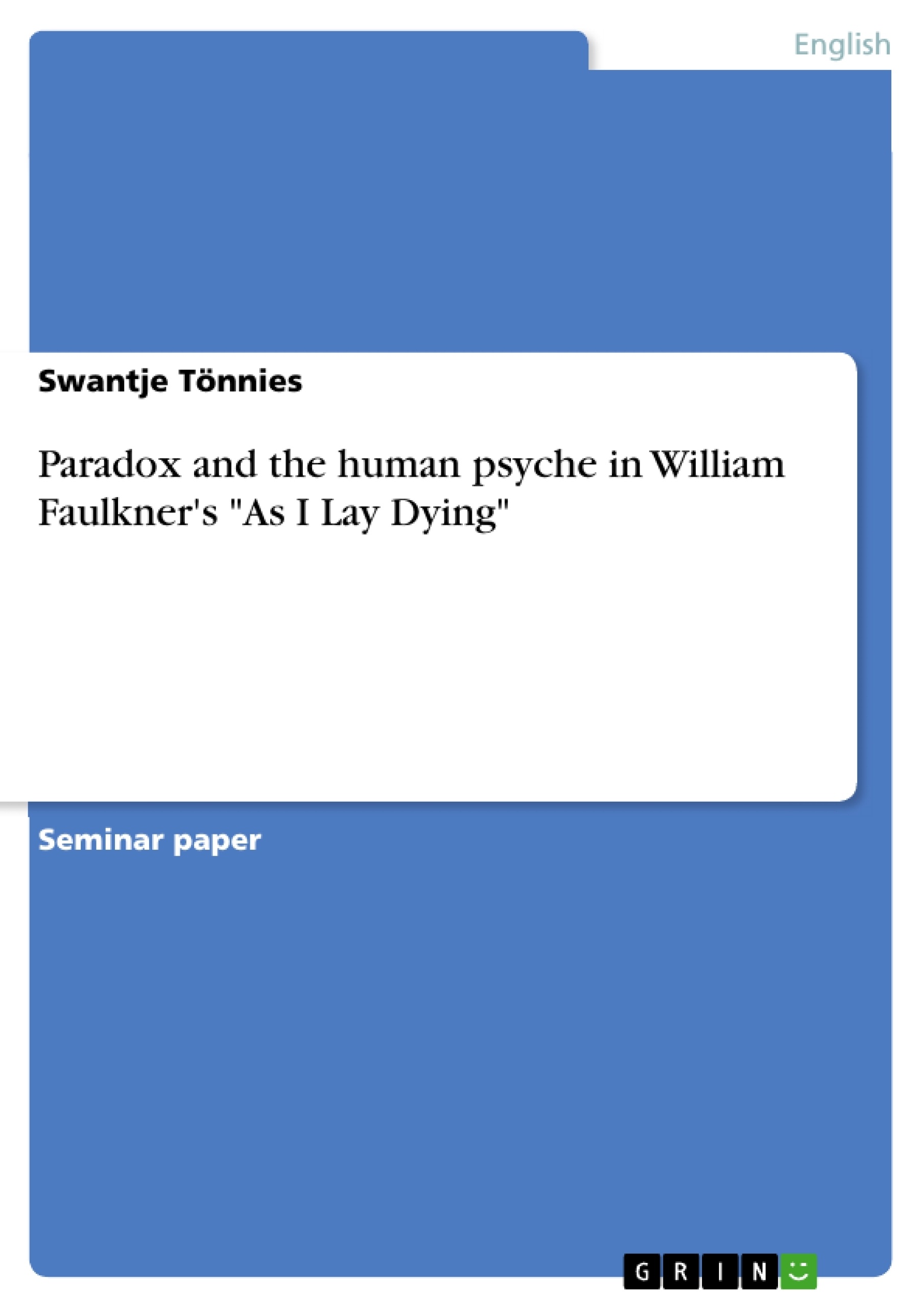To explore the themes of the novel and suggest interpretations of the characters’ attitudes towards life shall be the topic of this essay, especially with respect to the formal structure and narrative technique applied. This will include a discussion on how Faulkner has created a picture of the human psyche and how this seems to be dominated by controversial thoughts, and how he portrays the struggle of human life as closely connected with the paradox of being in an uncertain state of existence: in between “a dying life and an active death.” Finally, it shall be explained why the novel is, after all, still a comedy – and a difficult though worthy read.
Inhaltsverzeichnis (Table of Contents)
- Introduction
- Problems of the Human Psyche in Modernity
- Trapped in Both Isolation and Community
- Trapped Between Life and Death
- Obscurity and the Construction of Reality / Comedy
- Conclusion
Zielsetzung und Themenschwerpunkte (Objectives and Key Themes)
This essay examines the themes of William Faulkner’s novel As I Lay Dying, particularly focusing on the portrayal of the human psyche and its struggle with the paradox of existence. It explores the novel's structure and narrative technique to understand how Faulkner creates a picture of the human psyche dominated by conflicting thoughts. It delves into the characters' attitudes towards life and the absurdity of their existence, as well as the impact of isolation and community on their experiences.
- The human psyche in modernity and its complexities
- The paradox of isolation and community in human existence
- The absurdity and futility of life as depicted in the novel
- The role of communication and language in understanding human experience
- The significance of Faulkner's narrative technique and its impact on the reader
Zusammenfassung der Kapitel (Chapter Summaries)
The essay begins by placing As I Lay Dying within the context of modern literature, highlighting its portrayal of moral confusion and the absence of a clear sense of purpose. The chapter explores the novel’s representation of the human psyche, particularly through the character of Darl, who articulates feelings of alienation and the search for meaning in a world devoid of clear answers.
The essay then delves into the theme of isolation and community, examining how the characters grapple with the challenges of communication and the limitations of language. The structure of the novel, with its fragmented chapters and shifting perspectives, is discussed as a reflection of this disconnectedness, challenging the reader's ability to grasp the full meaning of the narrative.
Finally, the essay analyzes the novel's comedic elements, arguing that Faulkner's seemingly incoherent narrative is intentional and serves to highlight the absurdity of the human condition. By creating a sense of obscurity and incomprehensibility, Faulkner forces readers to confront the paradoxical nature of human existence, where meaning is elusive and the search for understanding is a constant struggle.
Schlüsselwörter (Keywords)
The essay focuses on key topics such as the human psyche, paradox, isolation, community, communication, narrative technique, absurdity, modern literature, and William Faulkner. It examines the themes of the novel As I Lay Dying through these lenses, exploring the complexities of human existence and the challenge of understanding the world around us. The essay also draws attention to the work of various authors, including Warren, Leary, and Weiskel, whose perspectives contribute to a deeper understanding of the novel's themes and significance.
Frequently Asked Questions
What is the central theme of Faulkner's "As I Lay Dying"?
The novel explores the human psyche, moral confusion, and the paradox of being in a state between "a dying life and an active death."
How does the narrative technique affect the reader?
The fragmented structure and shifting perspectives reflect the characters' isolation and the difficulty of grasping a single objective reality.
Why is the character Darl significant?
Darl serves as a key voice for articulating alienation and the complex, often conflicting thoughts within the human psyche in modernity.
Is "As I Lay Dying" considered a comedy?
Yes, the essay argues that despite its grim subject, the novel uses absurdity and obscurity to create a form of dark comedy about the human condition.
What role does communication play in the novel?
The story highlights the limitations of language and how characters remain trapped in isolation even within a community.
- Quote paper
- Swantje Tönnies (Author), 2006, Paradox and the human psyche in William Faulkner's "As I Lay Dying", Munich, GRIN Verlag, https://www.grin.com/document/92532



